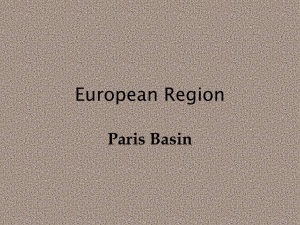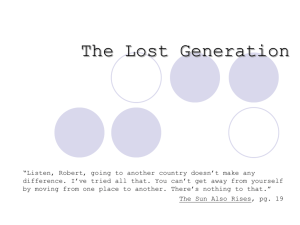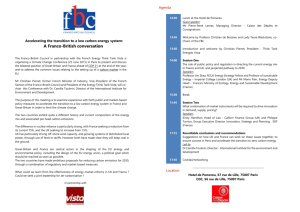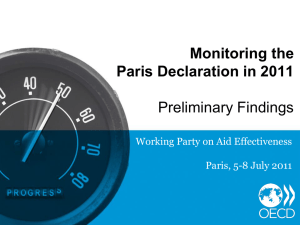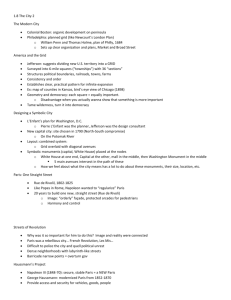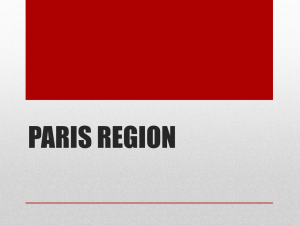File - leavingcertgeography
advertisement
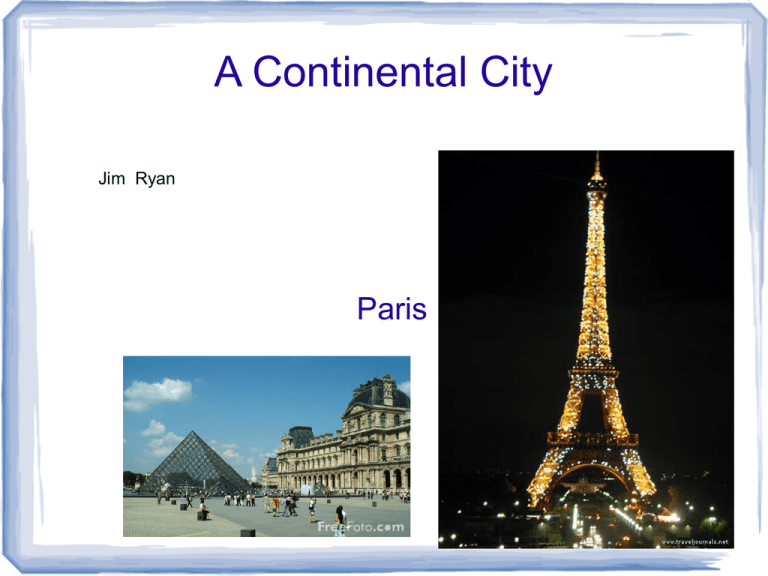
A Continental City Jim Ryan Paris Development of Paris Part Of European Core The Growth of The City Largest City in Europe – Population of over 11 Million in the Greater Paris Region Developed on an island called Ile De France on the River Seine Defensive Location and Bridging Point -Over 100 Km's from coast People moved to the walled city for safety reasons and for communication requirements Paris has many natural physical advantages for settlement – Saucer-Shaped Depression/Permeable underlying Rock/Rich Limon deposits/Good Drainage – Seine/Undulating land/Linked to sea by Seine (Le Harve) An important and diverse agricultural base – Cereal Production(Ile De France) Dairy(Brie) Viticulture (Wine) (Champagne Humide) The Growth of Paris Result of these advantages is that it has become a centre for employment Centre of Government and provides thousands of jobs in Civil Service Large population increase post World War 2 due to large in migration of people from the rest of France – Led to large natural increase as birth rates became much higher than other areas of France Large growth of industrialisation at this time and along with the increase in population led to large new suburbs growing outwards – Urban Sprawl Followed by large numbers of migrants coming from other areas such as North Africa (former colonies) – Migrant population of 1.5 Million (Problem with Integration) -Ghettos The Growth of Paris The rapid growth of Paris during the latter half of the 20th century has caused social and economic problems Traffic Congestion/Social Deprivation in poorer suburbs/Ethnic tensions (2004 riots)/High Cost of Housing/Urban Sprawl/Inner City Decline/Deindustrialisation Solution?? - Schema Directeur – To control growth of the city/Improve housing in Suburbs/Provide more employment/Provide Recreational Areas 8 Large Nodes built within the city boundaries in areas that had fallen into a poor state of repair – Example of one of these is La Défense 200,000 Residents/100,000 jobs – Important locations for Industry and Services They were designed to reduce commuting and improve quality of life La Défense One of 8 New Nodes developed within the City The Growth of Paris The Greater Paris Region also had its problems – Large numbers of commuters/Congestion/Environmental Decline/The Dominance of the City restricted potential investment in the Region To control Urban Sprawl the Schema Directeur focused on developing 5 New Towns (Overspill Towns) These were created along two axes North and South of the River Seine Examples of these towns are – Evry/Marne-la-Vallée/St. Quentin-en-Yvelines They each have populations of aprx. 100,000 have a modern layout/plenty of recreation space/employment and a wide range of services – Have helped reduce Urban Sprawl but not completely successful in this manner The Growth of Paris New Towns Developed up to 100kms Outside of Paris The Growth of Paris Dominance of Paris (A Primate City) has been harmful to other regions of France The result has been that French National Planners have had to try and develop policies to help other regional cities grow They have chosen National Growth Centres such as Marseilles/Bordeaux/Lyons/Lille – A large amount of investment has gone into these areas to help them grow and restrict Paris Dominance Government Department Decentralisation has also been implemented to help develop these growth centres The Nord Region A Peripheral Region diminished by the dominance of the Paris Basin – Redevelopment of Lille has helped narrow the gulf Success of regional policy: growth and development in the periphery Recent regional policy has seen a growth of industry and services in the periphery



